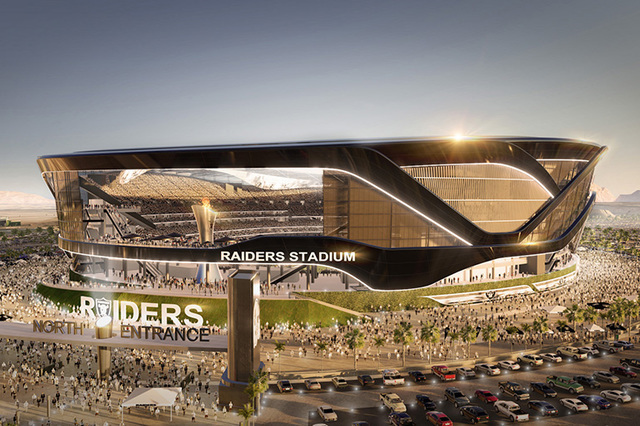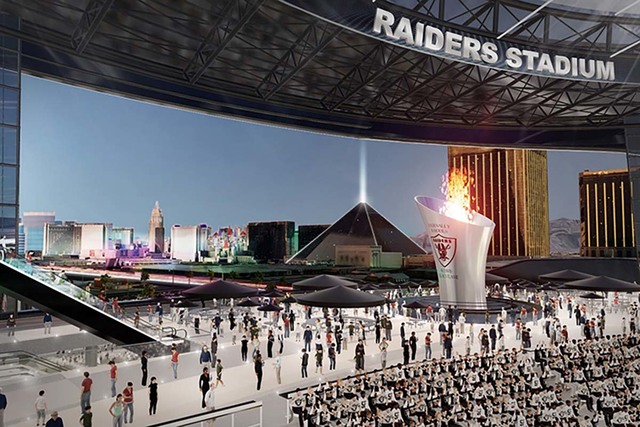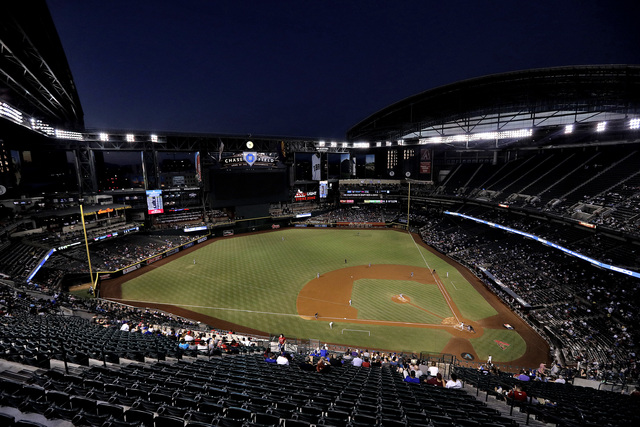Las Vegas Stadium Authority should beware potential Raiders escape clause, expert says







If the Las Vegas Stadium Authority board begins reviewing the terms of a proposed lease agreement with the Oakland Raiders on Thursday, they‘ll want to pay close attention to the “Expected Facility Standard.”
It could amount to an escape clause that gives the Raiders the ability to leave Las Vegas before the end of their lease, according to a legal expert who has negotiated contracts between professional sports teams, including the New York Yankees, and stadium owners.
Right now, financing for the stadium’s construction is a more pressing issue for the Raiders’ potential relocation to Las Vegas. Last week, Sheldon Adelson, who proposed the domed stadium and brought the Raiders to Las Vegas just over a year ago, withdrew his $650 million investment in the $1.9 billion project. When Adelson walked, so did finance giant Goldman Sachs.
Authority Chairman Steve Hill said his board would continue to work with the team with the assumption that finalizing a stadium lease would be another important step before NFL owners consider the Raiders’ relocation request in late March. Thursday’s authority meeting will start at 1 p.m. at the Clark County Government Center.
Daniel Etna, a partner in the corporate department of New York-based Herrick Feinstein and co-chair of the firm’s sports law group, said the Raiders’ draft lease has generated headlines because the team proposed paying $1 a year in rent and having control of the scheduling and field markings for UNLV football games.
However, Etna said the Expected Facility Standard should be a bigger concern. It is defined in the lease proposal as a responsibility of the Stadium Authority “to operate and maintain the stadium and stadium infrastructure in a safe, clean, attractive and first-class manner similar to and consistent with other premier, top-tier NFL facilities.” He said the lack of clear definitions in such clauses have been used by teams to leave or threaten to leave cities before the expiration of their agreements over stadium maintenance issues.
“Notwithstanding that the Raiders lease this for 30 years, and I think there are two five-year renewal options, a clause like that can also be more troubling than a $1-a-year rent when you have significant government subsidies coming in,” Etna said in a telephone interview. “If for whatever reason it doesn’t work out, it could be a potential escape hatch to get out of the lease.”
LESSONS FROM PHOENIX
Las Vegas need look only 300 miles south, to Phoenix, for an example of a team in a dispute with its stadium operator over “facility standard.”
The Arizona Diamondbacks Major League Baseball team plays at 48,500-seat Chase Field, which opened in 1998. The team engaged in a public dispute with the Maricopa County Stadium Authority last summer over the need for stadium improvements. Last month, the Diamondbacks filed suit to remove a lease clause that prevents them from talking to other entities about moving the team. The team contends the county has not made $135 million in improvements to the facility.
Under the terms of the contract, the Diamondbacks must play at the domed stadium in downtown Phoenix through 2028 and cannot talk to other cities about relocation until 2024.
Fields Moseley, communications director for Maricopa County, whose board of supervisors serves as the board of the Maricopa County Stadium District, said the county tried for three years to resolve the dispute out of court. Moseley said the county has received an extension to file a response to the lawsuit later this month.
He said the stadium disrepair is a result of concrete degradation resulting from power-washing stadium surfaces. Moseley said the agreement specifies that the team is responsible for regular maintenance, but the county is required to pay for some capital improvements to maintain the building.
When the lawsuit was filed, Diamondbacks managing partner Ken Kendrick issued a statement saying the team had exhausted all potential remedies.
“We have made a promise to our fans, who have been partners with us on the building of this stadium and our franchise, to provide the best experience in all of baseball in a safe and welcoming environment,” the statement said. “The inability of the Maricopa County Stadium District to fulfill its commitments has left us with no other option.”
NEGOTIATING STRATEGY
Etna said he expects the Raiders and the authority, which recently hired the Andrews Kurth law firm of Houston and Las Vegas-based Brownstein Hyatt Farber Schreck as its legal counsel, will look at rent, UNLV facility use and other issues in the proposed lease as starting points for negotiations.
“I think that this has been a very emotionally charged, closely watched type of process unfolding and perhaps it’s part of an overall negotiating strategy in that, one, clearly all the cards of this game haven’t been turned over yet and, two, sometimes when you go out with a very aggressive type of draft, you are putting a pole in the ground,” Etna said. “When you start moving away, it allows you to create the optic of, ‘Hey, we’re giving on this, we’re giving on that,’ but it kind of obscures the fact that you staked your pole way out at the far end of the negotiating table to begin with.”
The Review-Journal is owned by the family of Las Vegas Sands Corp. Chairman and CEO Sheldon Adelson.
Contact Richard N. Velotta at rvelotta@reviewjournal.com or 702-477-3893. Follow @RickVelotta on Twitter.













